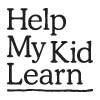What to do with this activity?
Listen to the author Tracey Corderoy reading her story "No!" on Youtube. It's about Archie the little rhino who always says "no", until one day he says "yes" and it makes all the difference. Talk about the story together.
By the age of three most kids have realised that they can say "yes" or "no". Often this means they say "no" when you want them to do something. If you feel that your child is saying "no" too much, here are some tips that might help:
- Give your child real choices to help them feel that they have some control. For example, "red or green towel?" to get them out of the bath, rather than "time to get out now" (which gives them a chance to say "no").
- Distract them with fun, humour and silliness - "let's do a monkey walk to the bathroom", rather than "go upstairs to the bathroom". Sometimes a challenge works - "bet you can't get into your pyjamas in under a minute".
- Be careful not to overuse the word "no" yourself. If you see your child doing something you don't like, calmly make a positive suggestion of a new activity, rather than saying "no" loudly. Give them a reason why the new activity is a better idea.
If you would like to find more useful advice on toddlers who say "no" a little too often, have a look at the parents.com website.
-
Why am I doing this?
Reading aloud combines the benefits of talking, listening and storytelling within a single activity and helps to build the foundation for language development. From stories your child learns many things such as how to listen and concentrate, new words and understand why things happen. They also learn to put ideas in order, develop their memory skills, notice how spoken words relate to words on the page and learn how to predict. Reading gives your child a chance to develop their own opinions, build visual skills and learn how to handle books.
-
How can I do more?
If you can spare 10 minutes a day to read with your child you can make a huge difference to their development. You don’t have to read a book, you could read a comic, magazine article or a story you have made up yourself. The most important thing is that you enjoy it, that way your child will too.
Remember a good storybook is one that you the reader and your child find interesting. It might be funny or entertaining. Ask yourself whether your child would enjoy it and be able to listen to it. Are the pictures well drawn? Is it well written? Do you like it? You may be the one reading it, over and over, and over!
Rate this activity
![]()
![]()
![]()
![]()
![]()
Based on 30 reviews
How would you rate it?
1 = Poor, 5 = Great.



